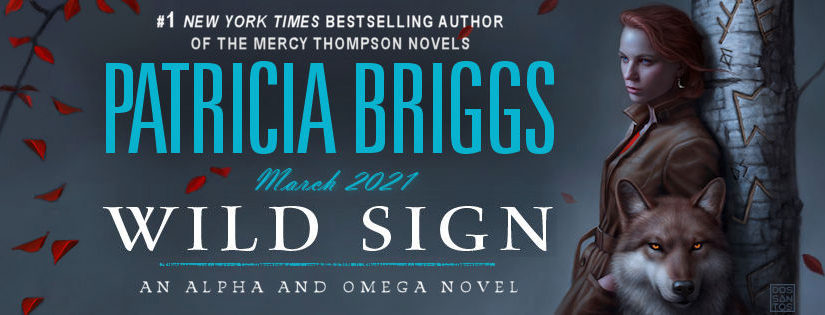I have a definite thing with the paranormal concept of “mating”, which is mostly understood to be an unbreakable romantic bond that exists independent of the emotional state of love. Obviously, romance novels have certain parameters to them, namely, that there be an HEA or HFN, so mostly they don’t address the glaring problem that a bond like this, one independent of emotion, can represent. So I kind of freak out when writers address the potential disconnect between mated bond and honest affection, because it’s so vanishingly rare. The newest Alpha & Omega novel, Wild Sign by Patricia Briggs, addresses this issue. The only other novel that I can think of that takes on a disconnect between mated bonding and real affection was one of Elizabeth Hunter’s Irin Chronicles, The Secret. That instance was utterly heartbreaking.
I have a pet theory that the “mating bond” acts as a sort of safety net for people writing overbearing asshole types, which many of these shifters tend to be. The whole pack hierarchy of dominance/submission, which is de rigueur in shifter narratives, offers up a steady supply of pushy, domineering alpha males (literally! har har) whose behavior towards women would be legitimately alarming in real world contexts. (Hell, often their behavior towards other men as well.) With the introduction of the mating bond, that more or less ensures the romantic lead won’t go fully physically abusive, though of course the more intangible methods of abusing and controlling one’s partner are still fully on the table. Admittedly, the Alpha & Omega series isn’t quite a romance series, though it includes a strong romantic through-line, so much of my noodling about the mating bond doesn’t apply, exactly.
The Alpha & Omega books follow the married couple and mated werewolf pair, Anna and Charles Cornick, the Omega and Alpha of the series name, respectively. The werewolves in this universe are often incredibly violent, and the pack bonds are just the thinnest check on that violence. This is in direct contrast with shifters like the Changelings in the Psy-Changeling series by Nalini Singh, whose shifter nature instills a sense of protectiveness and community. Singh’s Changelings are almost constitutionally incapable of abuse; Briggs’s werewolves are all too capable of violent outbreaks, and in some cases predisposed. Further, Charles acts as his father, Bran Cornick’s enforcer, and Bran is the pack leader of all North American werewolf packs, a sort of uber-alpha. His direct pack is made up of the hurt, damaged, unstable, and otherwise not housebroken werewolves. As his dad’s strong arm, violence is literally Charles’s job. His bond with Anna provides ballast for him, a line out to softer, kinder human emotion.
But the mating bond between Anna and Charles — one that seems genuinely enviable — is not the relationship at issue in Wild Sign: it’s the prickly, disconnected connection between Bran Cornick and his mate, Leah. The fact that they are mated but seem to have a deep antipathy for one another has been a thing not just in the Alpha & Omega series, but the Mercy Thompson books as well, where Leah acted as mean step-mom antagonist. Frankly, the way the antagonism between Mercy and Leah was introduced and maintained was indicative of a problem Briggs had writing relationships between women, at the very least in the earlier novels in that series, but really going up to the one that took place in Europe? I find the individual novel names forgettable. Anna’s relationship with Leah has been less antagonistic, but largely Leah is portrayed as a harpy Bran ruefully puts up with. And honestly, if I were Leah, I would be less than impressed with Bran’s lackluster care and concern. His treatment of her as an irritant has never sat well with me.
Wild Sign acts as a corrective to this, and gives us not just Leah’s backstory, but also the origin story for her relationship with Bran Cornick. Anna and Charles head out to the California wilderness to investigate an off-the-grid town full of magical users which seems to have vanished without a trace. Apparently, this town was on land that Leah owns, and both the land and the reason for the town’s disappearance are connected to her mating bond with Bran. Suffice it to say, there’s some real nasty shit in her backstory, the kind of thing even Briggs addresses mostly euphemistically. Her bond with Bran is anything but ideal, almost an echo of said nasty shit, and it’s completely legible why they would hold each other at a distance. They are bonded by trauma, unbreakably so, but trauma isn’t actually ennobling, and intimate violations can play havoc with one’s ability to be intimate.
It’s a lot, and there were certainly points where I wondered if maybe it was too much. But then Briggs has never much shied from really nasty traumas, especially in Alpha & Omega. Charles and Anna met, after all, when he had to execute her pack leader because of the alpha’s brutal sexual, physical, and psychological abuse of Anna and others. And indeed, the antagonist in Wild Sign dredges up this history of violence for Anna — makes her relive it — in a way that felt true to the ways trauma can resurface, even for people who are functionally healed. Shifter narratives, especially those that center on werewolves, deal often with body trauma, I find, something having to do with the werewolf’s lack of control over their body, and the violence of the physical change.
That said, there are some real moments of levity in Wild Sign, like Anna and Charles’s run in with some sasquatch, or the basis for the monster of the week the novel has going. Which is good, because darkness pushes on everything they do, threatening to snuff out the sometimes tremulous light. It’ll be interesting to see what comes next.
